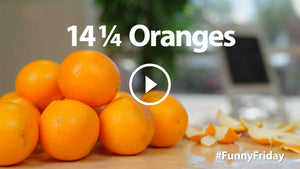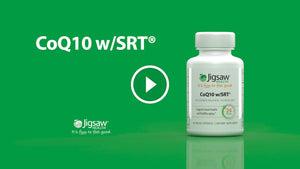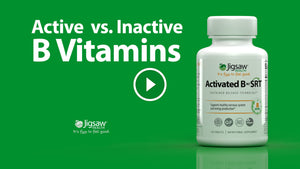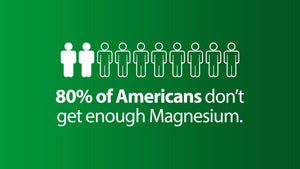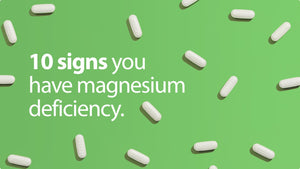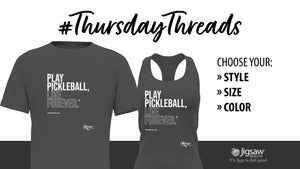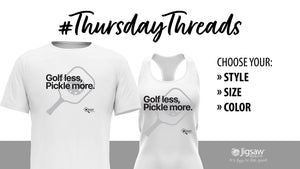"You're going to borrow from tomorrow for today..."
Thomas DeLauer breaks down the science behind the impact artificial sweeteners have on your brain on the latest #ScienceSaturday
Make sure you are meeting the RDI 400mg of Magnesium per day with Jigsaw's MagSRT® – America's #1 Time-Release Magnesium Supplement.
Subscribe for more Health & Nutrition education with Thomas DeLauer.

Click here to add 3 bottles of Jigsaw MagSRT to your cart and save $30.94 + Free Shipping.
Transcript by Rev.com
- What's going on, Jigsaw Land? It's time to take a real look at Albert Einstein. Okay, not really. We wanna take a look at Albert Einstein's Theory of Relativity but back it out as it pertains to health, as it pertains to our body. Everything is relative and today I wanna talk about excitotoxins.
Today we're gonna talk about how things respond in the brain in terms of an excitory effect. A lotta times, we talk about magnesium and calcium, relaxing excitory. But today, I wanna talk about GABA, and I wanna talk about glutamate, I wanna talk about those little packets that you're puttin' in your coffee. So let's get to it. So today I wanna talk about things that enhance flavor. I wanna talk about excitotoxins and their effect on the neurochemistry, their effect on the brain. So this isn't a video to bash artificial sweeteners or anything like that. This is a realistic video talking about the effect of our brain cells when it comes down to anything that enhances flavor.
All right, so what exactly is an excitotoxin? It sounds like an exceptionally scary thing. But it's actually pretty basic. See, when you look at an artificial sweetener, when you look at something like MSG, you're talking about an excitotoxin. And it's called an excitotoxin because when that substance hits your tongue, it triggers your taste buds to send a signal to your brain. And it sends a signal to your brain to tell your brain that something is exceptionally sweet even when it's really not sweet. So it's sending a communication that is kind of false. And that is triggering your brain cell to become extremely, extremely excited. That's why it's called an excitotoxin.
So we're taking something, some kinda substance, and we're artificially creating a flavor, whether it's sweet, whether it's salty, whether it's savory, you name it. So that's exactly what it comes down to when we're talking about the effect on the brain with excitotoxins. Now some examples of excitotoxins, we're talking about things like monosodium glutamate, we're talking about aspartame, we're talking about saccharin, we're talking about Sweet 'N Low, we're talking about Sucralose, anything that is enhancing the taste of something. Heck, some would even say that Stevia is considered an excitotoxin because it's still eliciting a response on the brain cells.
So what ends up happening is we ultimately over-stimulate our brain cells. So this is completely separate and apart from any other biological, digestive, or any other issues that might come with artificial sweeteners. This flat out has to do with the fact that when you ask something of your body that isn't really natural, you're going to borrow from tomorrow for today.
So I wanna reference a study before I get going on this so that there's a little bit of credibility to back this whole thing up. See there's a study that was published in the journal Stroke that took a look at 3,000 individuals, and they had them chronicle their diets over the past. And they noted which participants consumed diet sodas and which ones did not. What they ended up finding was that those that had consumed the diet sodas were three times more likely to suffer stroke and dementia than those that consumed regular sodas.
Now, hear me out on this, because the study didn't take a look at a lot of other metabolic factors. But the fact is that it did look at neurochemistry and since diet sodas utilize a lot more in the way of excitotoxins because they use a smaller quantity of an actual sweetener to elicit the same or even more response than you would get from a sugary substance, we end up having the conclusion that excitotoxins do end up having a link with stroke and dementia. So let's get down to talking about what excitotoxins, and artificial sweeteners, and monosodium glutamate actually do inside the brain. So the second that that super sweet substance hits your tongue, your tongue then sends a signal to your brain and says this thing is really, really sweet. So the brain cell becomes super, super stimulated. It's the whole idea.
We always have a communication going between the taste buds and the brain. So when something is hyper-sweet, for example something like Sucralose and we're talking about one packet being equivalent to a good amount of sugar, we're sending a very strong signal to the brain. This causes the brain cells to get super, super stimulated and they cause an excitory reaction. Eventually, those brain cells burn out, okay?
And sometimes, ultimately they even die. So when we have this consistently happening over constant consumption of artificial sweeteners or things that are gonna enhance the flavor of something, we end up causing some serious damage to the brain. We also have a high level of oxidative stress that occurs. So here's a cool analogy that makes some sense of this. Okay, if you were to go and work out with a lot of intensity, you would sweat and then you'd excrete some toxins. You'd excrete some waste. Then if someone asked you to work out five times harder, you'd sweat even more and you'd excrete even more waste. Well, the same is applicable for your cells in your brain.
So when your brain is just going along, happily-go-lucky, and then all of a sudden you consume some excitotoxins and you ask a lot of it, it ramps it into overdrive so that brain cells kick it into gear. And all of a sudden, it has to create a lot more waste. And it creates waste in the way of oxidative damage. That oxidative damage or oxidative stress causes damage throughout the rest of the body and ultimately can lead to cell death. And it can even lead to what's called lipid peroxidation where fats go bad inside your arteries, trigger more inflammation, and cause some heart disease. So yeah, there could be some links there with artificial sweeteners and MSG and heart disease later on down the line. Again, this video is not here to bash artificial sweeteners, it's just here to educate you on excitotoxins. So let's take a look at some examples of how this works.
One example is the glutamate system. You've probably heard of monosodium glutamate before, something that's commonly added to processed food, commonly added to Chinese food, to enhance the flavor and sort of enhance the savory component of a food. But what it's really doing is it's triggering glutamate receptors in your brain to make you think that something taste good. It's triggering an exciting response within your brain so your brain says I like this even if your mouth is saying I don't. It's pretty phenomenal and pretty scary at the same time.
But what's happening is you have specific receptors on your cells. You have NMDA receptors and you have non-NMDA receptors. All that means is you have two points at which glutamate binds to a cell. So when you consume monosodium glutamate, you're consuming a bunch of this glutamate that binds to a cell. And when that binding happens, it triggers an influx of what are called positive ions to flood into the cell. That's creating a bunch of energy and eventually kills the cell. That's why we end up seeing instances of stroke and instances of dementia.
Now, glutamate is a very delicate thing. In fact, we have it in the body, it's what triggers our brain to be sort of alive and have that excitory component. But it's always in balance with something known as GABA, gamma-Aminobutyric acid. So I talked about it in other videos, we have a balance of GABA and glutamate. And if that's ever out of balance, we're either super anxious or super depressed. So when we are exciting our brain and adding a lot of glutamate, we're exciting the brain to the point where our brain cells become anxious.
So we can almost make the conclusion that if we consume way too much in the way of glutamine, way too much in the way of artificial sweeteners, we could cause ourselves to have some anxiety. And the other side of the equation is looking at what's called aspartate or aspartic acid. Our cells have receptors for aspartate or aspartic acid on them as well. And it works in a very, very similar system as it does with glutamate. Maybe you've heard of aspartame before. It's what's commonly in most of our diet sodas, diet Coke, diet Pepsi, you name it, it's aspartame. Well aspartame, aspartate, we're working on that same cycle. We're working on that same kind of receptor that's triggering the brain to overall get super excited and then burn out.
So what we have to look at here is nothing super, super physiological, other than the fact that we can't expect to ask something of our body and not get a response. Everything in life is a give and a take, no matter how you wanna back it out, no matter what you wanna look at, there's always a reaction for every action. And if you're taking in a copious amount of sweet right now, if you today, are taking in the amount of sweetness that you would normally be taking in over the course of the month, there is no way that your cells are not going to respond in one day the way that they would otherwise in a month. You're just asking them to do it all at once. So it's like asking you to live your life, all 100 years, 110 years, 70 years, whatever, in a month. You're still gonna do everything but you're gonna die in a month. You're asking your cells to do the exact same thing .
So the purpose of this video is encourage you to look outside the box. Think outside the box. Think a little bit differently before you add things to your food to make them taste better.
As always, Jigsaw, make sure you're keeping it locked in here and if you wanna help negate some of the excitory effects, you can always rely on Jigsaw Magnesium SRT to bring you back down to earth. So click on the link and you can learn a little bit more about how that works. See you soon.







